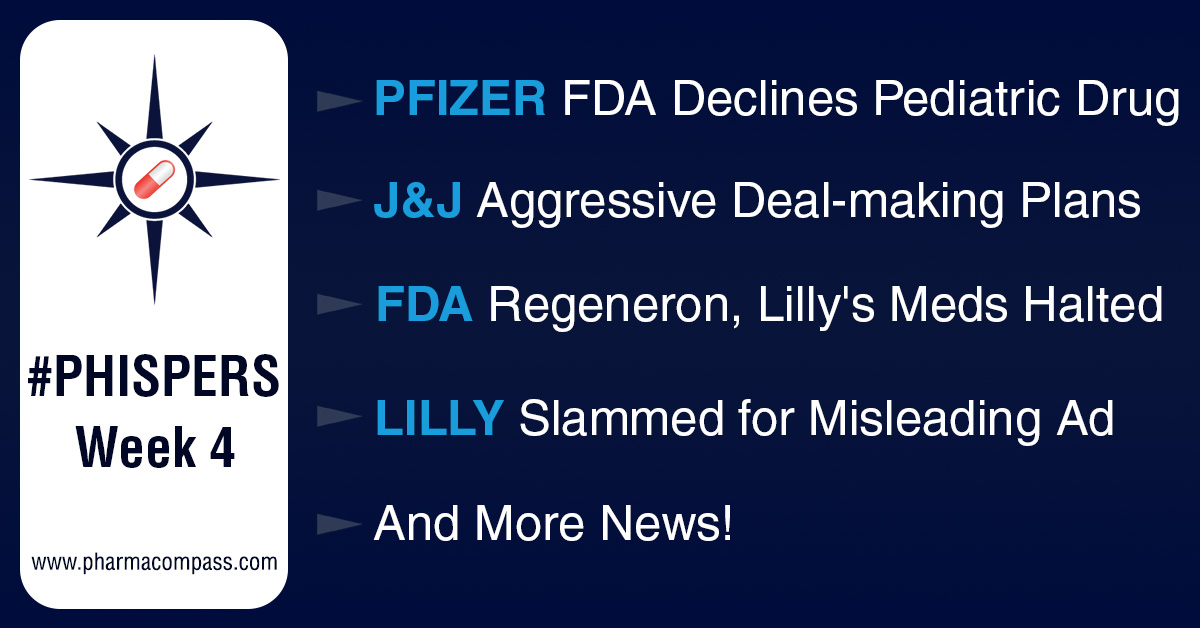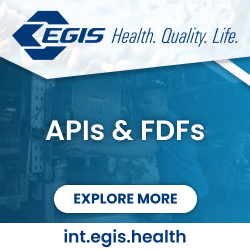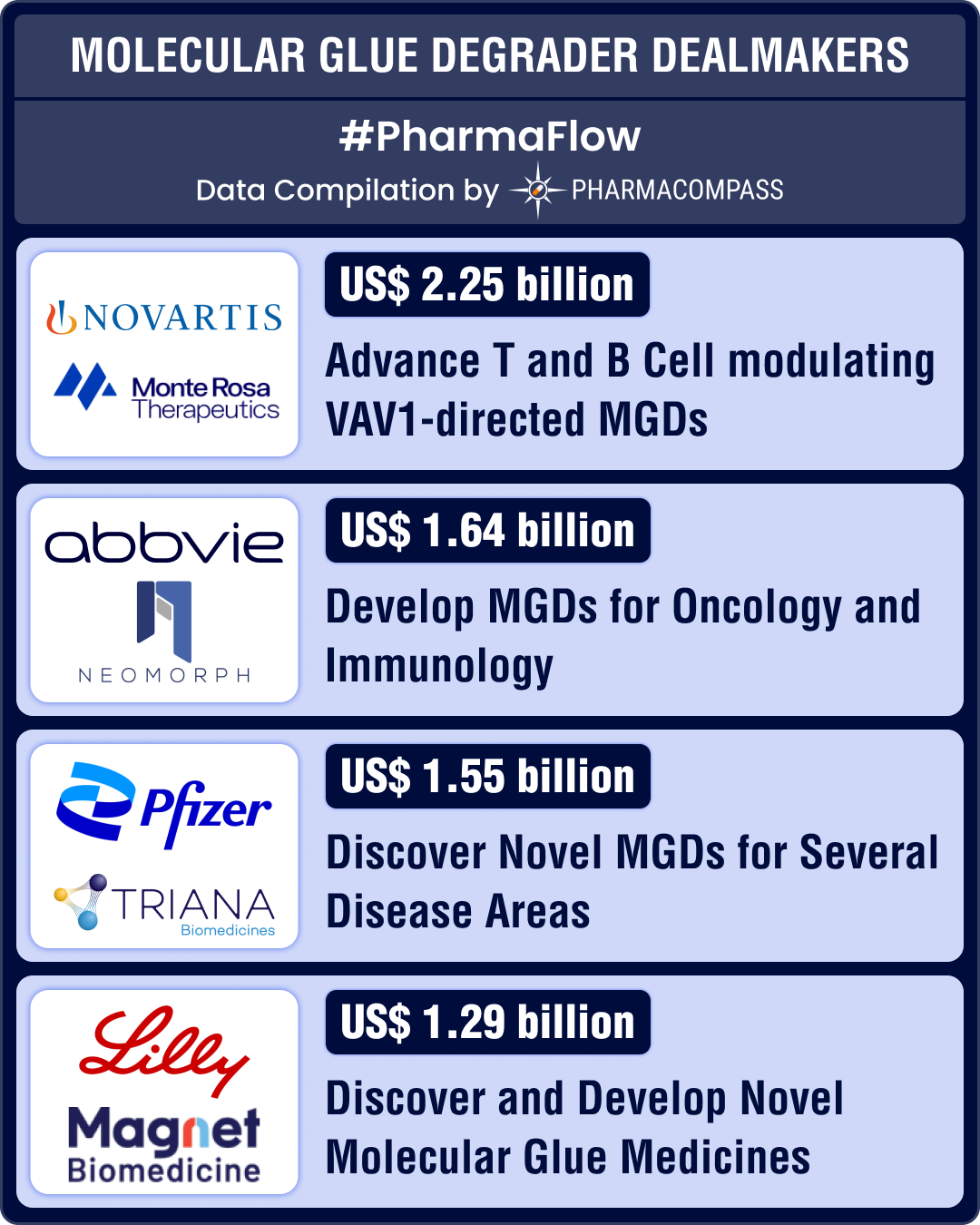
By PharmaCompass
2022-01-27
Impressions: 1,368
This week, Phispers is packed with news from the US Food and Drug Administration (FDA) as the agency declined to approve drugs from Pfizer and Merck, while also halting the use of Regeneron and Eli Lilly’s Covid-19 antibody treatments in patients infected with the Omicron variant of the coronavirus.
While Pfizer received FDA’s complete response letter (CRL) for its pediatric drug aimed at treating growth hormone deficiency, Merck was asked to submit additional information regarding the effectiveness of its oral drug – gefapixant – for treatment of chronic cough.
The agency also issued a letter to Eli Lilly, warning it over a ‘misleading’ advertisement on Instagram for its diabetes drug, Trulicity. The agency has also placed a partial clinical hold on Gilead’s studies evaluating the combination use of cancer drugs magrolimab and azacytidine.
In M&A news, the new CEO of Johnson & Johnson, Joaquin Duato, and its CFO Joseph Wolk have both signaled that the American drugmaker will be aggressively looking for mergers and acquisitions in 2022. And Poland’s largest drugmaker, Polpharma, is reportedly scouting for partners to place a joint bid of US$ 4 billion (€3.5 billion) for its Czech rival Zentiva.
In opioid lawsuits, about 90 percent of local governments in the US have confirmed their participation in a proposed settlement of up to US$ 26 billion with J&J and three large drug distributors.
In other news, billionaire Mark Cuban made headlines by launching an online pharmacy – known as the Mark Cuban Cost Plus Drugs Company – that is offering generic drugs at affordable prices, sometimes at less than half the price of the next most affordable option.
FDA declines approval to Pfizer’s pediatric treatment for growth hormone deficiency
The US Food and Drug Administration (FDA) has declined to approve Pfizer Inc’s treatment for growth hormone deficiency in children, developed in partnership with OPKO Health.
The FDA’s complete response letter (CRL) has come as a surprise since the biologic drug – somatrogon – has already been approved under the brand name Ngenla in Japan, Australia and Canada. An official go-ahead in Europe is also expected soon after the EMA recommended somatrogon for marketing authorization in the EU.
Pfizer did not mention any reason for the CRL, but said the partners would be working closely with the agency to determine the best path forward.
The drugmakers had filed their once-weekly growth hormone deficiency (GHD) treatment for FDA approval earlier this month after a phase 3 study showed the drug is non-inferior to Pfizer’s established medicine, Genotropin, which is administered daily. Pfizer had landed commercial rights to the drug from OPKO seven years ago for US$ 295 million.
An FDA approval would have allowed Pfizer to compete with Ascendis Pharma, whose once-weekly growth hormone injectable was approved by the FDA in August and launched in October. Ascendis had cited late-stage data to claim that its drug allowed patients to grow 0.9 cm per year faster as compared to Genotropin.
Growth hormone deficiency is a rare disorder where the pituitary gland does not produce enough growth hormone. It is characterized by abnormally short height and affects one in about 4,000 to 10,000 children globally.
J&J bullish on M&As, on lookout for targets in biotech, medtech space
The new CEO of Johnson & Johnson, Joaquin Duato, and its CFO Joseph Wolk have both signaled that the American drugmaker will be aggressively looking for mergers and acquisitions in 2022.
Wolk told CNBC that though M&As are on the table for J&J every year, amid a stock market selloff and a strengthened balance sheet position, J&J may be even more aggressive in deal-making this year.
“We’re starting to feel very bullish about the prospects as we see some volatility in the market,” Wolk said. According to him, M&A targets include companies in the biotech and medical technology space.
“We think there can be an opportunity for us in 2022 to lean in on the acquisitions front,” he added.
J&J has US$ 32 billion in cash and marketable securities and US$ 34 billion in obligations. During the company’s earnings call this week, Duato also talked about acquisitions. “We are constantly looking at M&A as a key source of growth for our business. Our position in cash today makes us be more aggressive in that area,” Duato said on the call.
The planned spin-off of J&J’s consumer health business will not “slow us down, if we find the right opportunity,” Wolk said.
Meanwhile, Poland’s largest drugmaker Polpharma is in talks with potential partners to place a joint bid of US$ 4 billion (€3.5 billion) for a takeover of its Czech rival Zentiva. Polpharma has hired JPMorgan to select potential investors. Zentiva makes a wide range of generics and over-the-counter drugs. If placed, the bid would be almost twice the amount (US$ 2.2 billion) private equity firm Advent paid Sanofi for Zentiva in 2018.
Regulatory update: FDA halts use of Regeneron, Lilly’s antibody treatments in Omicron patients
The US Food and Drug Administration (FDA) has restricted the emergency use authorizations for Covid-19 antibody treatments from Regeneron and Eli Lilly citing recent data that suggests they are not effective against the Omicron variant of the coronavirus.
The agency limited the use of the two monoclonal antibody treatments – Lilly’s cocktail (bamlanivimab and etesevimab) and Regeneron’s treatment REGEN-COV (casirivimab and imdevimab) – to patients who have been infected with or exposed to a variant that is susceptible to these treatments.
Regeneron said it is working with the FDA to introduce additional monoclonal antibody treatments. In December, Lilly had said its antibody candidate, bebtelovimab, maintains neutralization activity against all known variants of concern, including Omicron.
Turns down Merck’s oral cough drug: The FDA also turned down Merck’s experimental oral drug for chronic cough and has sought additional information on the effectiveness of the treatment. According to Merck, FDA’s decision is not related to the drug’s safety.
The agency’s decision could push back the approval of the drug – gefapixant – by several months. Merck said it plans to meet the agency and discuss the next steps. If approved, gefapixant could become the first remedy for patients in the US who suffer from chronic cough. Last week, Japan’s health regulator had approved gefapixant for adults with refractory or unexplained chronic cough, to be marketed under the brand name Lyfnua.
Orders partial clinical hold on Gilead’s US$ 5 billion cancer drug: Gilead’s US$ 5 billion cancer drug candidate – magrolimab – received a setback when the FDA placed a partial clinical hold on studies evaluating the combination of magrolimab and azacitidine.
The partial clinical hold has been brought into effect due to an apparent imbalance in investigator-reported suspected unexpected serious adverse reactions between study arms (SUSARS), a company statement said.
While no clear trend in the adverse reactions or new safety signal has been identified, the California-based biotech is implementing the partial clinical hold across all ongoing magrolimab and azacitidine combination studies. Trials that test magrolimab alone — without azacitidine — or in combination with other agents are unaffected, the company said.
Pause on domestic inspections extended: The FDA has extended its pause on domestic inspections not considered mission-critical by at least another two weeks due to the Omicron variant-led outbreak of infections. On December 29, the FDA had decided to halt inspections until at least January 19 to ensure the safety of its employees.
While extending the pause on domestic inspections until February 4, the agency said it will continue to perform mission-critical inspections at home and abroad. The FDA hopes to “return to a regular cadence for foreign surveillance inspections” by April.
Pfizer-BioNTech, Moderna launch clinical trials of Omicron-specific vaccines
Pfizer and BioNTech have launched a new clinical trial to test a vaccine that would give protection against the Omicron variant of the coronavirus. The new vaccine will be included in a three-cohort study that will also examine different regimens of the companies’ existing Covid-19 shot — Comirnaty — the drugmaker said in a statement.
A day after Pfizer launched the trial, Moderna Inc too said it has started a mid-stage study testing a booster dose of its Covid-19 vaccine specifically designed to target the Omicron coronavirus variant.
Moderna said while a third shot of its original vaccine increased neutralizing antibodies against Omicron at the lower dose, their levels declined six months after the booster dose had been administered.
Lilly in trouble over ‘misleading’ Instagram ad for its top-selling diabetes drug
Of late, Eli Lilly has run into trouble with its ad campaigns. Last month, Eli Lilly was successful in quickly resolving FDA’s concerns over a series of ads regarding its migraine drug, Emgality. Now, the drugmaker has received an untitled letter from the FDA’s Office of Prescription Drug Promotion, chiding it over a “misleading” Instagram ad for its top-selling Type 2 diabetes drug, Trulicity.
The Instagram ad makes “misleading claims and representations” about the benefits and risks of Trulicity, which is a drug with multiple serious, potentially life-threatening risks, the FDA said in its letter. The agency specifically flagged the “suggestion that Trulicity will help ‘lower A1C’ in all patients, when this has not been demonstrated.” The A1C test is a common blood test used to diagnose type 1 and type 2 diabetes. The agency also noted that the indication and the limitations of use are inadequate. It has asked Lilly to respond to its letter within 15 days.
Lilly removed the ad on the same day it received the letter and will provide the FDA with a full response to ensure the issue is addressed. It is also conducting a full review of all active Trulicity promotional materials and plans to revise or discontinue any material that has been flagged by the FDA.
Billionaire Mark Cuban launches online pharmacy; takes on Big Pharma with low‑cost generics
Billionaire investor and owner of the Dallas Mavericks professional basketball team, Mark Cuban, has launched an online pharmacy to provide consumers with prescription drugs at low prices. The Mark Cuban Cost Plus Drugs Company, launched last week, is offering more than 100 generic drugs at affordable prices.
The online pharmacy purchases drugs directly from manufacturers, bypassing middlemen, to lower the price of prescription drugs. Several prescription drugs cost less than half of the next most affordable option, it claims. The drug prices factor in a 15 percent margin on top of the actual manufacturer prices and a US$ 3 pharmacist fee, the company said.
The pharmacy, however, doesn’t process insurance claims and requires customers to pay for their medications in cash. It plans to complete the construction of a US$ 11 million pharmaceutical factory in Dallas by the end of this year.
Most local govts join US$ 26 billion opioid settlement against J&J, drug distributors
About 90 percent of local governments in the US have confirmed their participation in a proposed settlement worth up to US$ 26 billion to resolve lawsuits that allege three large drug distributors and drugmaker Johnson & Johnson (J&J) had fueled the opioid epidemic in the country.
Confirming the news, lawyers behind the deal said local governments from 45 states and several territories that were eligible to participate in the settlement with drug distributors McKesson Corp, AmerisourceBergen Corp, Cardinal Health Inc along with J&J opted to do so by the January 26 deadline. Forty-four states have also agreed to settle with J&J.
The distributors have agreed to pay up to US$ 21 billion, while J&J will pay up to US$ 5 billion. The deal is the second-largest cash settlement ever, trailing only the US$ 246 billion tobacco agreement in 1998. The money is intended to fund addiction treatment, family support, education and other social programs.
The PharmaCompass Newsletter – Sign Up, Stay Ahead
Feedback, help us to improve. Click here
Image Credit : Phisper Infographic by SCORR MARKETING & PharmaCompass is licensed under CC BY 2.0
“ The article is based on the information available in public and which the author believes to be true. The author is not disseminating any information, which the author believes or knows, is confidential or in conflict with the privacy of any person. The views expressed or information supplied through this article is mere opinion and observation of the author. The author does not intend to defame, insult or, cause loss or damage to anyone, in any manner, through this article.”








